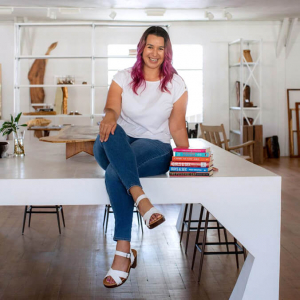
Sara Vogel, Title IX Coordinator at Hawaiʻi Community College, received a Fulbright U.S. Scholar Program award in Indigenous Education to research sexual empowerment education at Vancouver Island University in Canada for the upcoming academic year.
Vogel is among more than 800 U.S. citizens who will teach and/or conduct research abroad for the 2023–24 academic year through the U.S. government’s flagship international educational exchange program. For the past six years she has worked as a Title IX Coordinator in higher education, supporting survivors of sexual, relationship and gender-based harassment and violence, and was inspired to work in sexual education as a means of violence prevention and societal change.
“I want to research and create a comprehensive sexual education curriculum grounded in Indigenous practices, beliefs, and education modalities,” Vogel, who is Native Hawaiian, wrote in her application. “Specifically, I would like to develop a semester-long comprehensive sexual education curriculum, imbued with Indigenous values and knowledge about the body and sexuality, that teaches students how to create and tell one’s sexual story as a way to heal from sexual trauma, unlearn shame, and find empowerment in their sexual identity.”
She wrote that oral storytelling is a powerful Indigenous practice of passing on knowledge, and can be used as a novel approach to help students learn, connect, grow and evolve within sexual education. Vogel plans to share her Fulbright journey through weekly emails.
Sexual education leader
As the founder of Ladybits and Leadership, a sexual education company, and the host of Ladybits and Leadership: The Podcast, Vogel spends her time researching new innovative ways to normalize conversations on sex and bodies as a form of empowerment and violence prevention.
Vogel’s passion for education and student development began during her time as a student in international relations and working as a resident assistant at the University of the Pacific. She went on to earn her masterʻs in education in college counseling and student development from North Carolina State University, and a doctorate in educational leadership from the University of California, San Diego, where she researched the intersection of gender, race and leadership identity development.
Building international exchange
The Fulbright Program is funded through an annual appropriation made by the U.S. Congress to the U.S. Department of State’s Bureau of Educational and Cultural Affairs. Participating governments and host institutions, corporations and foundations around the world also provide direct and indirect support. Hundreds of U.S. scholars—faculty, artists and professionals from all backgrounds—teach or conduct research overseas through the Fulbright U.S. Scholar Program annually.
Fulbright scholars engage in cutting-edge research and expand their professional networks, often continuing research collaborations started abroad and laying the groundwork for forging future partnerships between institutions. Upon returning to their home countries, institutions, labs and classrooms, they share their stories and often become active supporters of international exchange, inviting foreign scholars to campus and encouraging colleagues and students to go abroad.

